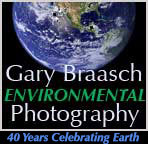Climate News and Views
October 2010
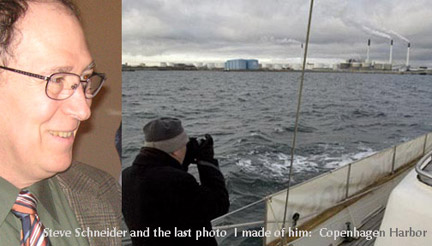
Our climate News and Views page is dedicated to Dr. Steve Schneider, who died this year in the midst of a celebrated career at Stanford as climatologist and public spokesman for science and the truth of global warming. In addition to his 40 years of leadership in researching, interpreting and acting with the science, he was a friend and mentor to World View of Global Warming from the very beginning. Here are the final words of a caption Steve wrote for my exhibit in 2009-10 at the American Assn for the Advancement of Science:
"Now, because of our population, how we get and use energy, conduct our agriculture and make use of the land, the human effect on climate is measurable and strong. Human activities have driven CO2 in the atmosphere to the highest level in at least 800,000 years, and global temperature is climbing out of the range in which human civilization evolved over the past several thousand years. Sea level rise, water availability, ecosystems, weather extremes and other systems are also moving out of the range of variability that we and many other species are used to. That process could be reversed before exceeding temperature levels of the past 10,000 years if prompt actions to curtail the emissions that create this warming were to become a global political priority." -- Stephen H. Schneider, November 2, 2009
Arctic sea ice continues its fast decline year by year, affecting ecosystems, human lives and the climate of the planet.

The 2010 ice amount at the end of the summer season was the third-lowest in the modern record, after 2007 and 2008, showing that there is no recovery in the sharp loss of Arctic ice. The past four years were the lowest in summer area of sea ice, which has been measured since satellite views of the Arctic began in 1979. The trend has been an average loss of summer sea ice of about nine percent per decade.
The ice cover reflects sunlight, keeping the Arctic waters cold; it is habitat to polar bears, birds, walruses and smaller sea life; it protects shorelines where humans and other animals live; and is the ancient landscape and home of natives of the North.
Satellite data indicate that Arctic sea ice is continuing a long-term decline, and remains younger and thinner than it was in previous decades. "All indications are that sea ice will continue to decline over the next several decades," said NSIDC Director Mark Serreze. "We are still looking at a seasonally ice-free Arctic in twenty to thirty years."
Heat wave in summer 2010 was not only in United States, but worldwide
NOAA tracks world temperatures as well as those in the States, and their current mapping shows many areas of the world far above the normal -- the larger the red dot, the farther above normal. Killing heat waves hit China and Eastern Europe, especially Russia.
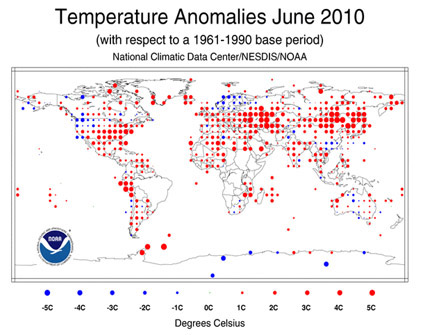
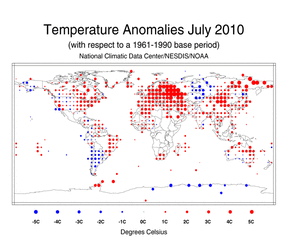
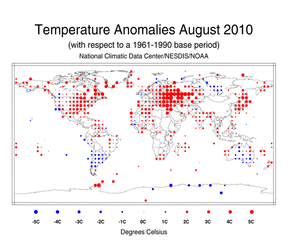
August 2010 Land Surface Temperature
NOAA said that he global combined land and ocean surface temperature of 14.5°C (58.1°F) was the warmest January-July period on record, and that temperatures this year tied with 1998 as the warmest January–September on record. The NASA Earth Observatory said "the intensity of the Russian heat wave exceeded anything scientists have seen in the temperature record since widespread global temperature measurements became available in the 1880s.
But can global warming cause such extreme weather events?" Often scientists say they can not attribute one particular weather event predominately to climate change. However, NASA suggested another way of asking the question: "Would an event like the Moscow heat wave have occurred if carbon dioxide levels had remained at pre-industrial levels?" The answer, Dr. James Hansen asserted, is clear. "Almost certainly not. Were global temperature not increasing, " he said, "the chance of an extreme heat wave such as the one Moscow experienced, though notimpossible, would be vanishingly small."
COPYRIGHT NOTICE:
Photography and text Copyright © 2005 - 2017 (and before) Gary Braasch All rights reserved. Use of photographs in any manner without permission is prohibited by US copyright law. Photography is available for license to publications and other uses. Please contact requestinformation@worldviewofglobalwarming.org. View more of Gary Braasch's photography here.

